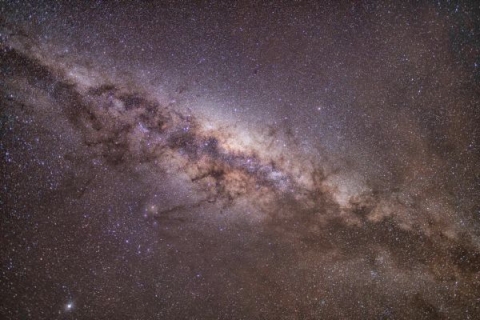

The ultimate goal of the Dark Energy Survey is to better understand the accelerating expansion of the universe and the phenomenon of dark energy.
19 January 2021
3 min read
Scientists from across the world have catalogued almost 700 million astronomical objects in the most detailed survey ever taken of the dark sky.
Scientists on the Dark Energy Survey (DES), including those from the University of Portsmouth’s Institute of Cosmology and Gravitation, have released the second dataset – mapping over an eighth of the entire sky. This includes a catalogue of nearly 700 million astronomical objects to add to the 400 million objects catalogued in the first dataset, released in 2018.
The ultimate goal of DES is to better understand the accelerating expansion of the universe and the phenomenon of dark energy, which is thought to be responsible for this accelerated expansion.

It has been an extraordinary experience to see hundreds of scientists working together to bring the Dark Energy Survey to this point. The newly released dataset is very rich and I can't wait to see what new surprises people find in it.
Professor David Bacon, Institute of Cosmology and Gravitation
The universities of Cambridge, Edinburgh, Manchester, Nottingham, Southampton, Sussex and Portsmouth have been involved in filtering through and analysing the huge amounts of data, leading to this data release.
Professor David Bacon from the Institute of Cosmology and Gravitation, University of Portsmouth, said: “It has been an extraordinary experience to see hundreds of scientists working together to bring the Dark Energy Survey to this point. The newly released dataset is very rich and I can't wait to see what new surprises people find in it.”
The second release of images and object catalogues from the DES is the culmination of many years of astronomical data collection and analysis.
Researchers from around the world can access this novel data and use it to make new discoveries about the universe. DES has produced the largest and most accurate dark matter map from galaxy weak lensing to date, as well as a new map that will be released in the near future.

ICG was one of the first institutions to join the Dark Energy Survey back in 2004 supplying key support in those early days. Over the years, we’ve made crucial contributions through our early career researchers and leadership.
Professor Bob Nichol, Pro Vice-Chancellor (Research and Innovation)
Professor Ofer Lahav from the University College London (UCL), who chairs the DES:UK consortium, said: “This is a milestone for this long-term project, defining one of the largest imaging data sets in Astronomy.
“The data set has allowed us to not only learn about the mysterious nature of dark energy and dark matter, but it has also led to discoveries in our solar system and in our own Milky Way galaxy, and follow ups of gravitational wave events and other cosmic phenomena. It is wonderful to have this data set available to everyone in the world to mine it and to make more discoveries."
The UK has been involved in this international project from its conception, back in 2004, with the Science and Technology Facilities Council (STFC) providing funding on behalf of the UK for what is the largest galaxy survey so far ever undertaken. Eight UK institutions, including the University of Portsmouth, are involved in the DES.
Scientists at UCL, with funding from STFC, provided precision optics systems for the Dark Energy Camera – the most powerful survey instrument of its kind.
The 570-megapixel digital camera is the main tool of the survey, and includes the five precisely shaped lenses, the largest nearly a yard across, which was designed and fabricated at UCL before being built at Fermilab in the United States and mounted on the 4-metre Victor M. Blanco telescope in Chile.
Having the opportunity to be part of this international collaboration as a PhD student has been very important for my career as a researcher.
Maria Vincenzi , PhD student
University of Portsmouth PhD student Maria Vincenzi presented the latest results of the DES on behalf of the Dark Energy Survey at the latest American Astronomical Society meeting.
Maria said: “Within DES, we have been able to discover and follow-up 2,000 supernovae, which will help us to measure accurately how fast our Universe is expanding and learn more about dark energy.
“These results are testament to the hard work and dedication of many people and it was very exciting to represent the DES Supernova Working Group and show the great results we are achieving.
“Having the opportunity to be part of this international collaboration as a PhD student has been very important for my career as a researcher. It has given me the chance to work with amazing data and to be mentored and collaborate with brilliant scientists locally at Portsmouth and Southampton.”
Professor Bob Nichol, Pro Vice-Chancellor (Research and Innovation) at the University of Portsmouth’s and Maria’s PhD supervisor said: “The ICG was one of the first institutions to join the Dark Energy Survey back in 2004 supplying key support in those early days. Over the years, we’ve made crucial contributions through our early career researchers and leadership. Maria’s presentation shows that dedication and is the product of many, but especially her own work. I am so proud of what she’s achieved.”
